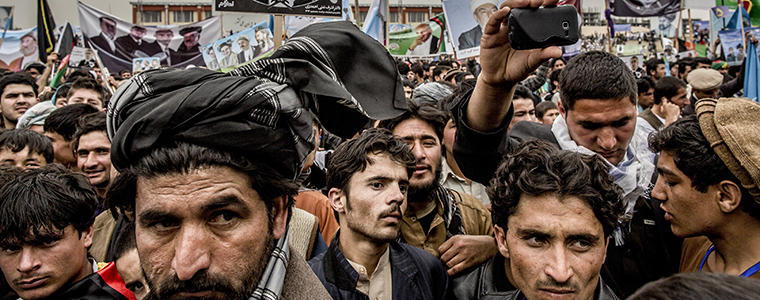Young people make up more than half – 68 percent – of Afghanistan’s population. That capacity to influence the upcoming presidential and provincial elections on April 5, paired with unprecedented enthusiasm during the campaign, is the ideal combination to propel a positive change.

Based on conversations with family in Afghanistan and friends on social media and from my monitoring of Afghan news, I see that the young Afghans of this new generation, who grew up during war, realize now that they have to seize the opportunity to organize and participate in the electoral process if they want to witness progress toward their country’s future. They not only closely follow election-related news in conventional media, but are also highly active on various social media platforms, discussing the presidential candidates and their policies.
Talking about the election has become a part of life in Afghanistan now. Young Afghans discuss the election at work, in schools, during dinners, in social gatherings and on social media. While uncertainty in the election still remains, many young people are optimistic and looking forward to a new chapter in the history of their country. They are tired of seeing so much violence in the last three decades of war.
Afghan youth, a category that most often includes anyone of the newer generation, even into the 30s, know that whoever succeeds President Hamid Karzai will impact their lives -- positively or negatively. They are more invested than in the past, because they are worried about their future and about the Afghanistan they will inherit. The thriving Afghan print and broadcast media and the emergence of social media have provided a new platform for sharing ideas and discussing topics.
During the election campaign period, which officially ended today in advance of the election, Afghan youth also participated in presidential campaigning. Pajhwok Afghan News, for example, reports that thousands of people, most of them young, organized and attended a gathering in Khost Province in the volatile east of Afghanistan to show their support for Ashraf Ghani Ahmadzai, one of the front-runners in the presidential race. The event was arranged by a youth organization with the help of local lawmakers. A coordinator at Ghani’s campaign office says the candidate has more than 60,000 registered youth volunteers who are working and reporting from different parts of the country, not counting those in the capital Kabul.
At another gathering in southern Helmand Province, young Afghans and civil society organizations rallied in support of another front-runner presidential candidate, Zalmai Rassoul.
Afghan media have dedicated extensive air time to election-related news, information and other programming, such as debates. That has helped every age group, including youth, to learn more about the election, the candidates and their platforms. Election-awareness programs on local radio stations target the remote regions, where access to electricity is limited.
By early 2014, Afghanistan had almost 90 television stations and 174 FM radio stations, according to BBC News. It also has hundreds of print media outlets, and the extent of election coverage appears unprecedented. Leading TV stations such as Tolo, Aryana, Shamshad and 1 TV have organized live presidential candidate debates. Political experts follow up with analysis of the debates in talk shows.
“The media has reached out to a significant number of people, and it has delivered the message on the importance of the election properly,” Habib Khan Totakhel, a young Afghan journalist working for Wall Street Journal in Kabul and an active social media user, told me in a Facebook message. “People wait for hours in voter registration centers to obtain their registration cards.”
Social media has emerged as an important platform, providing youth with an opportunity to campaign for their favorite candidates, express their views openly and vent their frustrations, with less fear of repercussions or societal pressures than they would feel if they were to express their views in traditional media or in social gatherings. Basharat Rahimullah, a media and peacebuilding officer at USIP’s Kabul office who has 5,000 Facebook friends, says 500 of them are either campaigning for their favorite candidate or engaging in election-related discussions.
“This is a big win for Afghans,” Mr. Rahimullah told me in a Skype conversation, “considering that Afghans have [only] recently started using social media.”
Though internet access remains low throughout the country, it has improved a great deal since the previous two elections. Of course, it’s mostly young, educated urbanites who use Internet and social media. Najeeb Zadran, a young Afghan entrepreneur, tells me that the educated youth are more likely than other young people to vote in hopes of a change for the better in Afghanistan. So increasing their access to information and social media is crucial.
Facebook is more popular in Afghanistan than Twitter, unlike some countries in the region such as Pakistan or Iran, where it’s the reverse. Still, presidential candidates use both Facebook pages and Twitter accounts to reach out to young voters, and the sites usually are run by young volunteers.
“It is encouraging to see some of the top presidential front-runners being represented by some educated and outspoken youth,” according to one friend who works in an embassy in Kabul. “It is even more encouraging to see these youth discussing some challenging issues such as human rights, women’s rights, transitional justice and more; this was something we could only dream of a few years ago. Campaigning through social media has no resemblance in the past political history of Afghanistan.”
Afghan youth believe that a peaceful transition of power is crucial for the future stability of their country, and presidential candidates recognize the necessity to reach out to them. Not only are the youth votes important to determining the election outcome, but without them, 68 percent of the country would be voiceless.
Spogmay Waziri Kakar is a program assistant in USIP’s PeaceTech Initiative. She is a BBC Pashto columnist and the co-founder of Pashtun Women VP website.



